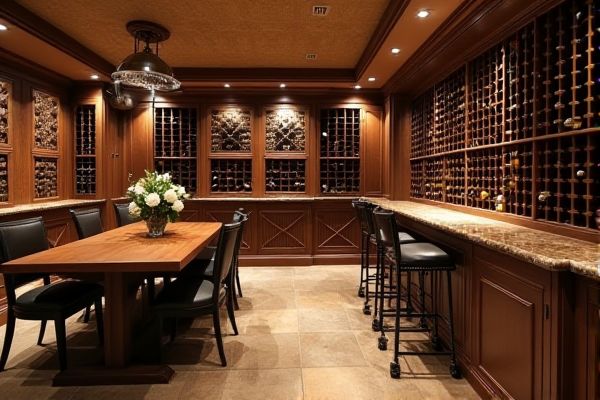
A wine cellar is specifically designed to store and age wine under optimal temperature and humidity conditions, enhancing the flavor and quality of your wine collection. To understand the key differences and find the best solution for your needs, explore the rest of the article.
Table of Comparison
| Feature | Wine Cellar | Storage Cellar |
|---|---|---|
| Purpose | Specifically designed for wine aging and preservation | General storage for various items |
| Temperature Control | Maintains consistent 50-59degF (10-15degC) | No specific temperature regulation |
| Humidity Control | Keeps 60-70% humidity to preserve corks | No humidity management |
| Construction | Insulated walls, often climate-controlled | Basic shelving, minimal insulation |
| Design | Racks designed to hold wine bottles horizontally | Flexible shelving for assorted goods |
| Lighting | Low UV lighting to protect wine quality | Standard lighting, not protective |
| Cost | Higher due to specialized equipment | Lower, simpler setup |
| Use Case | Wine collectors, connoisseurs, vineyards | Household storage, bulk goods, seasonal items |
Understanding Wine Cellar vs Storage Cellar
A wine cellar is specifically designed to maintain optimal temperature, humidity, and light conditions to preserve and age wine properly, featuring specialized racks and climate control systems. In contrast, a storage cellar serves a broader purpose, storing various items without strict environmental controls, making it less suitable for delicate products like wine. Recognizing these differences ensures the appropriate cellar type is chosen based on the intended use, particularly for wine enthusiasts prioritizing quality preservation.
Purpose and Function of Each Cellar
A wine cellar is specifically designed to store wine bottles under controlled temperature, humidity, and lighting conditions to preserve and enhance the wine's aging process and flavor profile. A storage cellar, in contrast, serves a broader purpose by holding various items such as food, beverages, or household goods, often without specialized climate control. The primary function of a wine cellar is to maintain optimal conditions for wine maturation, while a storage cellar prioritizes general storage needs with flexibility.
Temperature and Humidity Control
Wine cellars maintain precise temperature between 55degF and 58degF with humidity levels around 60-70%, ensuring optimal aging and preventing cork drying. Storage cellars often lack such controlled environments, risking spoilage due to fluctuating temperature and low humidity. Your wine collection benefits significantly from a dedicated wine cellar's specialized climate control system.
Structural Differences
A wine cellar features precise temperature and humidity control systems, insulated walls, and specialized racking designed to preserve wine quality and aging potential. Storage cellars prioritize general storage needs with robust shelving and less stringent climate control, often lacking insulation or humidity regulation. The structural differences reflect the specialized environmental requirements unique to wine preservation versus multipurpose storage.
Ideal Materials and Insulation
Wine cellars require materials like natural stone, brick, or wood that maintain stable temperatures and humidity levels critical for aging wine properly. Insulation in wine cellars often involves closed-cell spray foam or rigid foam panels to prevent temperature fluctuations and protect against external moisture. Storage cellars prioritize robust insulation such as fiberglass or mineral wool to control temperature but may use less specialized materials since the contents are less sensitive to environmental changes.
Storage Capacity and Organization
A wine cellar is specifically designed to store wine bottles horizontally at optimal temperatures and humidity, maximizing storage capacity for vintages and organized by type or vintage year. In contrast, a storage cellar serves a broader purpose, accommodating various items with flexible shelving but lacks the specialized climate control crucial for wine preservation. Your wine collection benefits from a wine cellar's tailored organization and space efficiency, ensuring ideal aging conditions not provided by a general storage cellar.
Security and Accessibility Features
A wine cellar offers specialized security measures such as climate control, humidity monitoring, and secure locking systems designed to preserve wine quality and prevent unauthorized access. Storage cellars prioritize accessibility with shelving and space optimization for various items but typically lack advanced temperature and security controls. Your choice depends on whether you prioritize optimal preservation with enhanced security or versatile, easy access for general storage.
Maintenance Requirements
Wine cellars demand consistent temperature and humidity control, typically maintained between 55degF to 58degF and 60-70% humidity, to preserve wine quality and prevent cork drying. Storage cellars require less precise environmental conditions but still need basic ventilation and moisture control to avoid mold and damage to stored items. Regular monitoring and occasional repairs of insulation, cooling units, and dehumidifiers are essential for optimal maintenance in both cellar types.
Cost Comparison
The cost of a wine cellar typically exceeds that of a standard storage cellar due to specialized climate control systems, humidity regulation, and custom racking designed to preserve wine quality. Storage cellars require less investment in insulation and environmental controls, making them more affordable for general storage purposes. Installation and maintenance expenses also differ significantly, with wine cellars demanding higher ongoing costs to maintain optimal conditions for wine aging.
Choosing the Right Cellar for Your Needs
Selecting the right cellar depends on your primary purpose: wine cellars are specifically designed to maintain ideal temperature, humidity, and lighting for aging wine, while storage cellars offer more flexibility for general items but lack precise climate control. Consider factors such as temperature consistency, humidity levels, ventilation, and security features tailored for wine preservation when choosing a wine cellar. For broader storage needs, a storage cellar provides ample space and ease of access but may not protect delicate wine properties over time.
 homyna.com
homyna.com